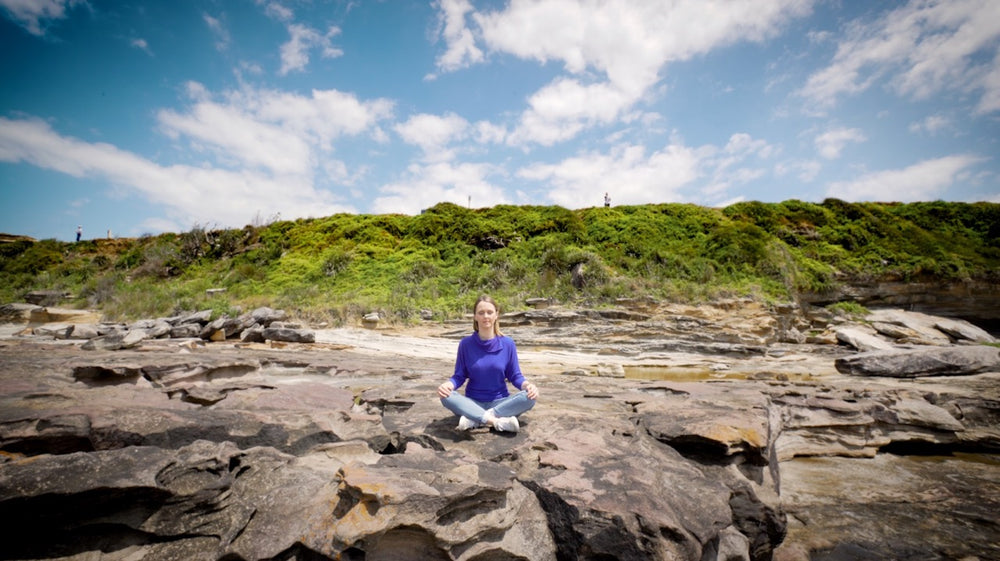
At 8:30 next Monday morning I’ll be lying in an MRI machine having my brain scanned again. I’m feeling nervous about it. Not because I have a fear of enclosed spaces and not because I’m worried about what the experts might find. I’m worried about what the experts might not find. That is, I’m worried that my brain will be exactly the same as it was 93 days ago before I began meditating daily.
This is part of a new documentary I’m making about meditation. In recent months I’ve been traveling around the globe, meeting scientists, monks, meditation teachers, and people with remarkable stories of transformation. Over the course of the year, I’m also meditating every day and participating in the gold-standard meditation program used by researchers (MBSR). Down the track I’ll even brave a 10-day silent retreat.
Throughout all this, a team of scientists are poking, prodding, scanning and screening me to see what changes with my stress levels, my brain and immune function, and even my DNA. My goal is to transform from being a stressed-out working mother with an autoimmune disease, to being calm, balanced and healthy.
So why would I worry that Monday’s brain scan will be a bust? After all, everyone knows meditation is good for you. We’ve all seen the headlines. It’s a proven fact that it changes your brain. So, if I’ve been diligently meditating for 93 days, the scientists should find brain changes. Right?
Well, actually, it turns out that those behind the revolutionary rise of mindfulness into the mainstream are concerned that it is being oversold and overhyped. I recently interviewed Richard Davidson, a neuroscientist whose seminal studies paved the way for the scientific credibility of meditation. “I think it's important that we recognise that despite the fact that there is this explosion of scientific interest, we're still at a very, very early stage. And sometimes, particularly lay people I think, over interpret the findings that we have, and have more confidence in them than we should,” he said.
One of the reasons meditation science is fraught with difficulties is the fact that it’s impossible to lock 20,000 people of a variety of ages, ethnicities, and genders into a lab for 50 years and have them meditate in the exact same way for the exact same amount of time, while keeping every other variable including sleep, diet, exercise, interpersonal relationships and life circumstances the same.
Davidson and his friend and leading science journalist Daniel Goleman recently released a new book in which they reviewed the mountain of scientific literature on meditation. They found that most of it was questionable. “There were 6000 studies when we started out. These are all in what are called peer-reviewed journals, academic journals. But, using really rigorous criterion – "Is there a randomised control group? Is there what's called an active control condition? Did they use hard measures or soft measures – We got down to 60. Think about that. That's one percent,” Goleman told me.

With the integrity of so much of the scientific literature being called into question, my world is spinning. Science is the reason I turned to meditation in the first place. After being diagnosed with an autoimmune disease 12 years ago and spending $30,000 trying everything and anything that offered a cure, I decided to place my trust in science. And, among other things, the science said to meditate. So I did, and you guessed it, I started to feel better. While meditation is far from being the only reason I started feeling better, it’s a significant factor. And I consider it to be no small thing that after the birth of my second baby, when life started to involve a whole new level of busy and I stopped meditating, that I noticed troubling early warning signs that my autoimmune disease would flare.
The critical thinking health journalist in me can’t help but wonder if it’s all been a big placebo – or worse, that I’ve fallen for, and contributed to the rise of another ineffective self-help fad. But the thing is, despite the fact that the meditation science is being questioned by the very thought-leaders who instigated its rise, I still think it works. When I’m meditating regularly I’m better at regulating my emotions, my insomnia disappears, I’m nicer to my kids and more able to connect with people I care about, and, perhaps most importantly, I’m better able to stick to my health goals such as healthy eating and sleeping enough. In other words, what happens during the formal practice of sitting in meditation, flows out into my everyday life.
So you can see my quandary. The goal of my new film is to show the benefits of meditation for people in the real-world. To show that you don’t have to join a monastery, or sequester away at a luxury wellness retreat in order to find the time and experience the benefits of meditation. But it is quite possible that my year-long self-experiment will fail on a scientific level and that all the tests will show absolutely nothing changes. In that event, I’m not yet sure how I feel about meditation but it’s something I’ll have an hour and a half to contemplate on Monday morning while I’m lying trapped in an MRI machine in my endeavour to find out.





 The Connection (DOWNLOAD-TO-OWN)
The Connection (DOWNLOAD-TO-OWN) My Year Of Living Mindfully - Book
My Year Of Living Mindfully - Book




